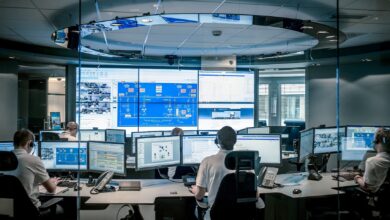Plenary panelists: Industry must not repeat same personnel mistakes from '90s
Conference chairman Walter Simpson, BG Group, opened the session by noting that, despite the market slump, more than 1,450 delegates had registered for the event and that exhibition space had doubled from previous years.
Even though the conference theme – “Total Value Drilling: Right People, Right Process, Right Technology” – was organized back during the better boom times, Mr Simpson said that our challenges are really no different. Actually, especially during times like these, getting people, process and technology right can be even more important.
Maersk Drilling’s Claus Hemmingsen, 2009 IADC chairman, also offered opening remarks by urging everyone to remember that safety and the environment must remain top priorities, even as we confront a slow market.
We “can pride ourselves on being an innovative industry with a can-do attitude,” he said. “We find solutions to virtually any problem we’re faced with. So let us take this opportunity to share our knowledge and increase the overall standing of the industry at large.”
PANEL DISCUSSION
Moderated by Alison Goligher of Shell, the plenary session – titled “Right People for the Next 30 Years?” – addressed the key question of: “How are we to ensure we have the right people and in the right numbers to take us through the next 30 years?” Panelists were Steve Haden, BP; Catherine MacGregor, Schlumberger; Steven Newman, Transocean; and Peter Sharpe, Shell.
Mr Haden began by noting that our personnel challenge is really about “plugging a capability gap.” Technological challenges to drilling are increasing, with deeper, hotter and farther wells; new frontiers like the Arctic; and more expertise needed per barrel.
First, we must hire and train smart young people, he said. Then, are we asking enough of our younger staff? How can we challenge younger staff earlier? he asked.
Mr Sharpe noted the need for operators to find more efficient ways to work with its partners, whether drilling contractors or service companies, because everybody’s average expertise levels have gone down. One option is to use real-time operations centers to better leverage experience among staff.
Ms MacGregor reminded the audience that with operating environments being pushed to extremes, the role of technology in our industry is increasing. She encouraged more cross-sector training for employees – for example, drilling engineering with geophysics with well placement. Pushing people beyond their own domain will help to enable new technologies that may require understandings of several technological domains.
Noting that some companies are already imposing hiring freezes and layoffs, Mr Newman commented, “We haven’t learned from the past.” Those are the same kind of reactions that industry had to previous market down-cycles that got us into the personnel shortage in the first place, he reminded the audience.
He pushed for companies to take a longer-term vision versus a quarter-to-quarter reaction and to get out of the boom/bust mentality. The world economy is likely to rebound, pushing energy demand and prices up again, so investing in talent now makes sense, he said.
Questions from the audience touched on difficult subjects such as how to carry employees through tough economic times, whether industry has invested enough in R&D, and how companies can help Wall Street analysts to understand the importance of investment in people.
One audience member from Anadarko Petroleum raised the question of how we can combat image problems when the mass media continue to perpetuate an outdated and distorted view of the drilling industry? How can we increase our attractiveness as a career option for the next generation?
Mr Haden noted that BP has been working directly with students on a high school level to provide a healthier perspective of the industry. And Mr Newman added that outside of Western Europe and North America, the industry actually enjoys a reputation for being excellent employers. Industry must globalize its search for new talent to areas like China, India and the Middle East.
On Wednesday, the plenary session will focus on “Technology – Evolution or Revolution?” Lance Cook, Shell, will moderate the session, with panelists Braulio Luis Cortes Xavier Bastos, Petrobras; Bob Bloom, National Oilwell Varco; Tim Juran, Seadrill Americas; and Halvor Kjorholt, StatoilHydro.




